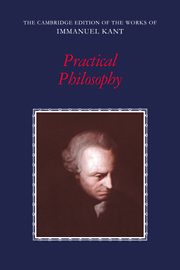Book contents
- Frontmatter
- Contents
- General editors' preface
- Preface
- General introduction
- Review of Schulz's Attempt at an introduction to a doctrine of morals for all human beings regardless of different religions (1783)
- An answer to the question: What is enlightenment? (1784)
- On the wrongfulness of unauthorized publication of books (1785)
- Groundwork of The metaphysics of morals (1785)
- Review of Gottlieb Hufeland's Essay on the principle of natural right (1786) [translated and edited by Allen Wood]
- Kraus's review of Ulrich's Eleutheriology (1788)
- Critique of practical reason (1788)
- On the common saying: That may be correct in theory, but it is of no use in practice (1793)
- Toward perpetual peace (1795)
- The metaphysics of morals (1797)
- On a supposed right to lie from philanthropy (1797)
- On turning out books (1798) [translated and edited by Allen Wood]
- Editorial notes
- Glossary
- Index of names
- Index of subjects
General introduction
Published online by Cambridge University Press: 05 June 2012
- Frontmatter
- Contents
- General editors' preface
- Preface
- General introduction
- Review of Schulz's Attempt at an introduction to a doctrine of morals for all human beings regardless of different religions (1783)
- An answer to the question: What is enlightenment? (1784)
- On the wrongfulness of unauthorized publication of books (1785)
- Groundwork of The metaphysics of morals (1785)
- Review of Gottlieb Hufeland's Essay on the principle of natural right (1786) [translated and edited by Allen Wood]
- Kraus's review of Ulrich's Eleutheriology (1788)
- Critique of practical reason (1788)
- On the common saying: That may be correct in theory, but it is of no use in practice (1793)
- Toward perpetual peace (1795)
- The metaphysics of morals (1797)
- On a supposed right to lie from philanthropy (1797)
- On turning out books (1798) [translated and edited by Allen Wood]
- Editorial notes
- Glossary
- Index of names
- Index of subjects
Summary
Kant was drawn to philosophy through his interest in natural science, not through moral or political concerns. His systematic interests in practical philosophy were slow in developing, and in the beginning his theoretical discussions of morality were governed less by his substantive moral convictions than by concerns about the grounding of knowledge and the architectonic structure of a system of philosophy. Yet from early in his career, Kant did have distinctive and deeply held moral beliefs, formed partly, no doubt, by his pietistic religious upbringing, but profoundly influenced by modern Enlightenment culture and especially by the writings of Jean- Jacques Rousseau. In the end, Kant's mature thought was grounded on the primacy of the practical, and the critical philosophy is at least as much a moral outlook as it is a position on matters of knowledge, theory, or speculative metaphysics.
Among the works Kant published during the last decade of his life, the emphasis was heavily on practical topics – morality, religion, politics, education, pragmatic anthropology, the final end and historical destiny of the human species. Kant's critical writings on practical philosophy, here collected for the first time in a single volume, are equal in importance and influence to anything else in his philosophy, even the Critique of Pure Reason.
THE FOUNDATIONS OF MORAL THEORY: 1762–81
At the end of 1762 Kant submitted to the Prussian Royal Academy of Sciences a prize essay, Inquiry concerning the Distinctness of the Principles of Natural Theology and Morals (in the competition it finished second to an essay by Moses Mendelssohn).
- Type
- Chapter
- Information
- Practical Philosophy , pp. xiii - xxxivPublisher: Cambridge University PressPrint publication year: 1996

